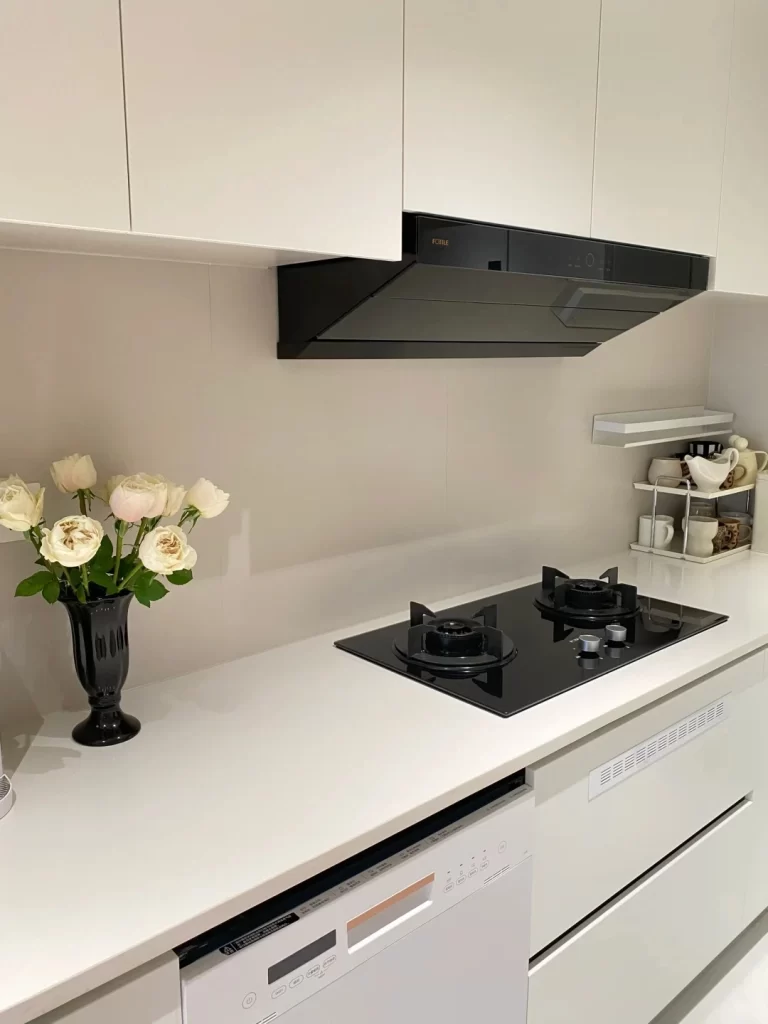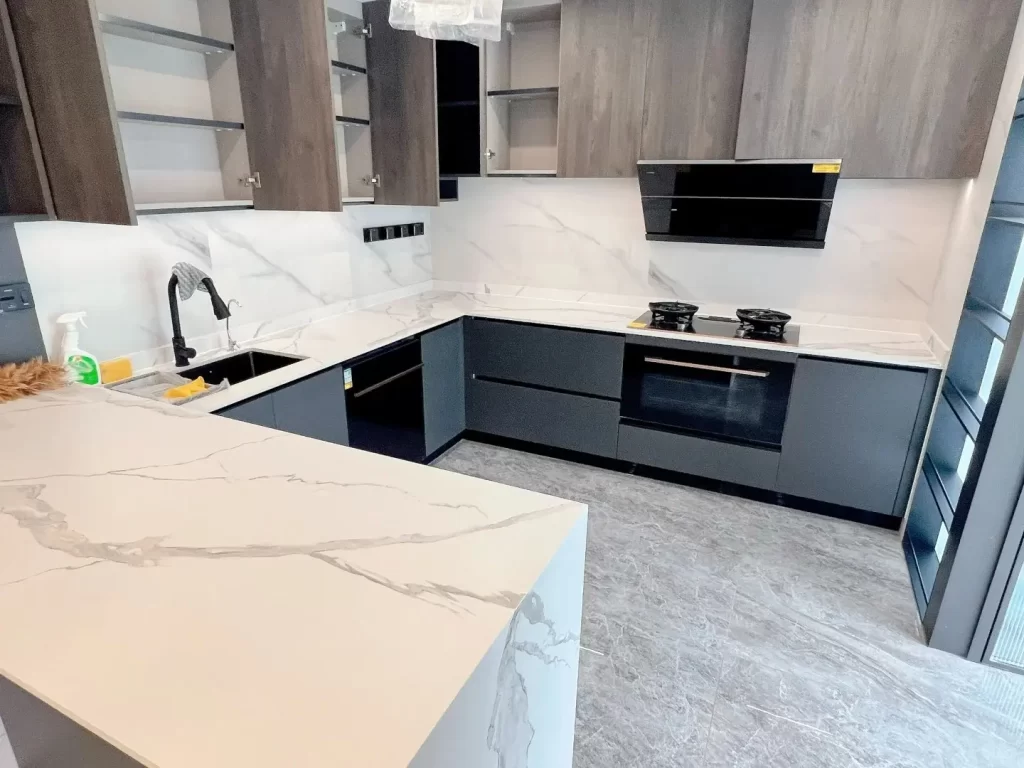Within the area of natural stone worktops, white quartzite shines as a shining example of beauty and refinement that has stood the test of time. quartzite has been a popular option among homeowners and designers who are looking for a material that combines beauty and durability. Its pure colour, delicate veining, and long-lasting composition have contributed to its popularity. However, despite its widespread usage, there is a widespread misperception that white is an easily stained material. This mistake leads some people to question whether or not it is suitable for use in high-traffic areas such as kitchens, bathrooms, and other locations. Through the provision of information on its composition, features, and practical factors, the purpose of this all-encompassing guide is to debunk the idea that quartzite is resistant to stains. Join us as we explore the world of quartzite countertops and find the truth about the stain resistant qualities of this material.

What You Need to Know About White Quartzite
White quartzite is a natural stone that is made from sandstone that has experienced metamorphism. This process results in a material that is thick, long-lasting, and crystalline in structure. White quartzite is characterised by a colouring that is immaculate white, with faint veining and occasional traces of grey or beige. Quartz grains make up the significant portion of quartzite. White quartzite is a naturally occurring stone that is mined and cut into slabs for use in installations such as countertops, backsplashes, and other interior applications. This is in contrast to synthetic materials such as quartz countertops, which are engineered stone surfaces made of crushed quartz crystals and resin binders.
A Debunking of the Myth Regarding Stain Resistance:
Despite the widespread notion to the contrary, quartzite does not have a natural tendency to get stained. White countertops, when properly sealed and maintained, may provide exceptional resistance to stains, spills, and other typical home dangers. This is especially true when the counters are properly sealed. The goal is to have an awareness of the elements that determine the stain resistance of white quartzite and to take preventative steps in order to safeguard and keep its clean look.
In terms of its composition, quartzite countertops is mostly made up of quartz grains, which are among the most extremely hard minerals that can be found in the crust of the Earth. Because of its intrinsic hardness, white quartzite has a natural resistance to scratching, chipping, and etching, which makes it less vulnerable to damage from the usage that it receives on a daily basis.
Additionally, the crystalline structure of white quartzite is a contributing factor to its non-porous character, which facilitates the prevention of liquids and stains from permeating the surface and generating discoloration.
Despite the fact that white quartzite is naturally resistant to stains, it is nevertheless suggested to seal the surface on a regular basis in order to improve its stain resistance and protect it from any possible harm. Utilising an impregnating sealer of superior quality may assist in the filling in of any tiny holes or fissures that may be present on the surface of the quartzite, therefore establishing a barrier that is resistant to liquids and stains.


Concluding remarks:
In conclusion, white quartzite countertops provide a winning mix of enduring beauty and remarkable durability, with stain resistance characteristics that have the potential to compete with those of other natural stone surfaces. White quartzite countertops, when properly sealed and maintained, have the potential to deliver years of dependable performance and an elegance that is unmatched in kitchens, baths, and other interior areas. Homeowners may take pleasure in the immaculate beauty and long-lasting durability of white quartzite worktops for many years to come if they have a thorough awareness of the aspects that impact the stain resistance of white quartzite and if they adhere to the practical maintenance suggestions. We invite you to join us as we go further into the world of white quartzite countertops, examining design advice, installation procedures, and maintenance tactics that will assist you in creating the kitchen or bathroom of your dreams.
White quartzite is a natural stone known for its striking appearance and robust properties, resulting from the metamorphic process of sandstone under extreme heat and pressure. This dense, durable stone is characterized by its pure white color and delicate veining, making it a popular choice for worktops and other design applications.
White quartzite’s aesthetic appeal is due to its pristine white hue, often interspersed with subtle, intricate veins, which adds sophistication and elegance to any space. Its remarkable durability, comparable to granite, makes it highly resistant to scratches and wear, ensuring its longevity and ability to withstand daily use in high-traffic areas like kitchen countertops and bathroom vanities.
White quartzite’s resistance to heat and relatively low porosity contribute to its practicality as a worktop material, making it less susceptible to damage from hot pots and pans and less prone to staining compared to other natural stones. This combination of aesthetic beauty with functional resilience makes it a versatile and reliable choice for various home design projects.
One common misconception about white quartzite is that it is easily stained. This belief stems from confusion between quartzite and marble, which is known for its beauty but also susceptibility to stains due to its high porosity and calcium carbonate composition. However, white quartzite has a different mineral composition that makes it significantly more resistant to staining.
Expert opinions and real-life experiences highlight that proper sealing of quartzite enhances its already impressive stain resistance. Sealed white quartzite worktops can withstand spills from common household substances like wine, coffee, and oils without absorbing them, unlike marble counterparts.
Homeowners and designers who have chosen white quartzite for their worktops often express satisfaction with its performance, noting that their surfaces remain pristine and free from stains over years of use. This practical evidence supports the scientific understanding of quartzite’s durability and refutes the misconception that it is easily stained.
Quartzite, a naturally occurring metamorphic rock, is a dense and highly durable material that originates from sandstone. Its compact structure makes it an excellent choice for areas prone to spills and stains. The hardness of quartzite, typically ranking around 7, makes it harder than granite and significantly more resistant to scratching and chipping. This exceptional hardness ensures that white quartzite worktops maintain their pristine appearance even with regular use and minimal maintenance.
White quartzite is also known for its heat resistance, allowing it to withstand the heat from pots, pans, and other kitchen utensils without sustaining damage. This makes it a highly practical material for kitchen countertops, where exposure to hot cookware is common.
Easy maintenance is another compelling feature of white quartzite. Regular cleaning with mild soap and water is usually sufficient to maintain its lustrous appearance. This low-maintenance characteristic, combined with its aesthetic appeal, makes white quartzite an ideal material for both kitchens and bathrooms.
Maintaining white quartzite worktops is relatively straightforward with the right care techniques. The first step in ensuring the longevity and beauty of these natural stone surfaces is proper sealing. It is recommended to reseal quartzite worktops once or twice a year, depending on usage and the specific type of sealant employed.
Preventing potential stains involves a combination of proper cleaning habits and a few preventive measures. Always use coasters under glasses and hot pads under pots and pans to avoid direct contact with the quartzite, which could lead to thermal shock or etching. Spills should be wiped up promptly, as even sealed quartzite can be susceptible to certain substances if left for extended periods.
In the event of accidental spills, especially with acidic substances like wine, citrus juices, or vinegar, immediate action is necessary. Blotting the spill gently with a clean, dry cloth rather than wiping can help spread the liquid.
By adhering to these practical tips, homeowners can maintain the timeless elegance and stain resistance of their white quartzite worktops, ensuring they remain a stunning focal point in any kitchen or bathroom for years to come.
FQA
Is white quartzite easily stained?
Answer: Not easily! Its high density and low pores make it much more stain-resistant than white marble. Everyday stains like coffee, juice, and soy sauce will rarely leave a mark if wiped promptly.
What conditions could cause white quartzite to stain?
Answer: Leaving dark, oily items (such as unsealed ink bottles or expired cooking oil) for a long time, or stains seeping into cracks (if not properly sealed), can cause gradual staining. This rarely occurs with normal use.
What if you get a tough stain? How can you remove it without staining?
Answer: First, soak the stain in warm water to soften it. Then, wipe with a soft cloth dipped in a neutral detergent (such as dishwashing liquid). Avoid using steel wool or strong acid or alkaline cleaning solutions. Dry the surface immediately after wiping to avoid leaving marks.
Will kitchen countertops stain if they frequently come into contact with oil?
Answer: Most likely not! Oil spills from cooking can be easily wiped off with a damp cloth. Wipe the countertops clean every day, and even with long-term use, it’s less susceptible to staining, making it less of a hassle than white marble.
Does white quartzite need to be treated to prevent staining before installation?
A: We recommend it! Although it’s highly stain-resistant, applying a special protective agent can more thoroughly isolate stains, especially around joints and seams. Sealing it properly eliminates the worry of staining later.
Which is less susceptible to staining, white quartzite or white marble?
A: White quartzite is more resistant to staining! Marble has many pores, allowing stains to seep in easily. Quartzite, with its dense structure, resists staining, making it much less of a concern with daily care.

